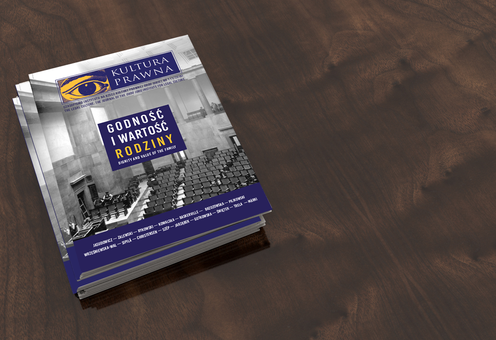Artykuły
Opublikowane 12-12-2018
Słowa kluczowe
- childcare,
- family policy,
- government support,
- parenthood
Jak cytować
Sipilä, Jorma. 2018. “Cash for Childcare As a Policy Instrument – Advantages and Limitations”. The Legal Culture 1 (1): 86-97. https://doi.org/10.37873/legal.2018.1.1.12.
Abstrakt
Prezentowany artykuł stanowi próbę zwrócenia uwagi na ekono-miczne konteksty funkcjonowania rodzin na terenie Europy. Autorprzedstawia różne rodzaje finansowego wsparcia dla rodzin na przy-kładzie wybranych krajów europejskich. Szczegółowej analizie zostajepoddana sytuacja, w której matki pobierają wynagrodzenie za pozosta-nie w domu i opiekę nad własnymi dziećmi.
Downloads
Download data is not yet available.
Bibliografia
- Aalto A.-M., Katsausosittaisenhoitorahankäyttöön 2000 luvulla, Helsinki: Kela, 2013.
- Anttonen A., Lasten kotihoidon tuki suomalaisessa perhepolitiikassa, Helsinki 1999.
- Anttonen A., Sipilä J., Care capital, stress and satisfaction, [in:] Women, Men, Work and Family in Europe, ed. R. Crompton, S. Lewis and C. Lyonette, Houndmills 2007. DOI: https://doi.org/10.1057/9780230800830_9
- Avdeyeva O., Social policy reforms in Hungary: Towards a dual-earner model?, Paper prepared for the EUSA Eleventh Biennial International Conference, Los Angeles, California, April 23–25, 2009.
- Bungum B., Kvande E., The rise and fall of cash for care in Norway: changes in the use of child-care policies, „Nordic Journal of Social Research”, vol. 4, 2013. DOI: https://doi.org/10.7577/njsr.2065
- Cash-for-childcare: The consequences for caring mother, ed. J. Sipilä, K. Repo and T. Rissanen, Cheltenham 2010.
- Haataja A., Kotihoidon tuki kehittyy omaan tahtiinsa Pohjoismaissa, „Sosiaalivakuutus” 17.3.2016.
- Haataja A., Juutilainen V.P., Kuinka pitkään lasten kotihoitoa? Selvitys äitien lastenhoitojaksoista kotona 2000-luvulla, Helsinki 2014.
- Heckman J.J., Schools, Skills, and Synapses, „Economic Inquiry”, vol. 46, 2008. DOI: https://doi.org/10.3386/w14064
- Heckman J.J., Masterov D.V., The Productivity Argument for Investing in Young Children, „Review of Agricultural Economics”, vol. 29, 2007. DOI: https://doi.org/10.3386/w13016
- Himmelweit S., Caring: the need for an economic strategy, „Public Policy Research”, vol. 12, 2005. DOI: https://doi.org/10.1111/j.1070-3535.2005.00398.x
- Kotihoidontuki kyllä vai ei? Tätä mieltä ovat suomalaiset, „Aamulehti” 6.4.2017.
- Lalive R., Zweimüller J., How does parental leave affect fertility and return to work? Evidence from two natural experiments, „The Quarterly Journal of Economics”, vol. 125, 2009. DOI: https://doi.org/10.1162/qjec.2009.124.3.1363
- Lasten kotihoidon tukea saaneet, „Findikaattori”, http:/www.Findikaattori.fi/fi/111.
- Leitner A., Wroblewski A., Welfare State and Work–Life Balance, „European Societies”, vol. 8, 2006. DOI: https://doi.org/10.1080/14616690600645092
- Lister R., Williams F., Anttonen A., Bussemaker J., Gerhard U., Heinen J., Johansson S., Leira A., Siim B., Topio C., Cavanas A., Gendering Citizenship in Western Europe. New Challenges for Citizenship Research in a Cross-National Context, Bristol 2007. DOI: https://doi.org/10.2307/j.ctt9qgzcn
- Mahon R., Child care: towards what kind of „Social Europe”?, „Social Politics”, vol. 9, 2002. DOI: https://doi.org/10.1093/sp/9.3.343
- Nyberg A., Cash-for-childcare systems in Sweden: history, political contradictions and recent developments, [in:] Cash-for-childcare: The consequences for caring mother, ed. J. Sipilä, K. Repo and T. Rissanen, Cheltenham 2010.
- Pohjola K., Haataja A., Juutilainen V.P., Lasten yksityisen hoidon tuki osana päivähoitoa, Helsinki 2013.
- Rakastettu ja vihattu kotihoidon tuki, ed. J. Sipilä, M. Rantalaiho, K. Repo and T. Rissanen, Tampere 2012.
- Rakkaudesta, velvollisuudestavairahasta?, ed. J. Sipilä, Helsinki 1994.
- Ramkvist K., Pappamakten, „Arena”, vol. 4, December 2006.
- Repo K., Finnish child home care allowance – users’ perspectives and perceptions, [in:] Cash-for-childcare: The consequences for caring mother, ed. J. Sipilä, K. Repo and T. Rissanen, Cheltenham 2010.
- Sipilä J., Lasten kotihoidon tuki poliittisena kysymyksenä, [in:] Rakastettu ja vihattu kotihoidon tuki, ed. J. Sipilä, M. Rantalaiho, K. Repo and T. Rissanen, Tampere 2012.
- Sipilä J., Anttonen A., Kröger T., A Nordic welfare state meets globalization: from universalism toward privatization and informalization, [in:] The welfare state in post-industrial society: A global perspective, ed. J. Powell and J. Hendricks, Dordrecht: Springer, 2009.
- Sipilä J., Repo K., Rissanen T., Viitasalo N., Cash-for-childcare: unnecessary traditionalism or a contemporary necessity?, [in:] Cash-for-childcare: The consequences for caring mother, ed. J. Sipilä, K. Repo and T. Rissanen, Cheltenham 2010. DOI: https://doi.org/10.4337/9781849804615
- Tervola J., Maahanmuuttajien kotihoidon tuen käyttö 2000-luvulla, „Yhteiskuntapolitiikka”, vol. 80, 2015.
- Trägårdh T., The ‘civil society’ debate in Sweden: The welfare state challenged, [in:] State and civil society in Northern Europe. The Swedish model reconsidered, ed. L. Trägårdh, New York 2007. DOI: https://doi.org/10.2307/j.ctt1x76dkp
- Ungerson C., Yeandle S., Cash for care in developed welfare states, Houndmills 2007.






